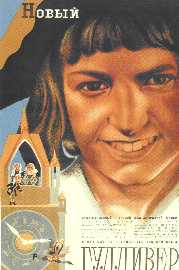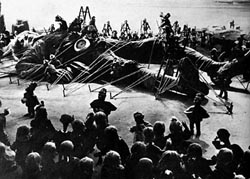
Alternate high-resolution image (155kb)

Alternate high-resolution image (155kb)
Petia, nicknamed "Gulliver" by the other young Pioneers (the major social and political organization for young boys and girls during the Soviet-era), falls asleep while listening to the counselor read aloud from his favorite book, Jonathan Swift's Gulliver's Travels. He awakens as "The Living Mountain," tied and bound in the land of the Lilliputians, which has evolved into a decadent bourgeois society still ruled by an absolute monarch―absolute in his power and his idiocy. Petia is transported to the royal court and fêted, though the king's ministers view with suspicion his egalitarian speeches. They convince the king that Petia poses a threat to his absolute power and receive permission to poison him.
The oppressed workers of the king's underground munitions factory, however, warn Petia. They have found and read his journal entries, which celebrate the union of the workers of the world, and are planning a revolution of their own. Petia drinks the poisoned brew but spits it out unnoticed. Believing Petia to be dead, the king's soldiers, tanks, and fleet begin their attack on the workers, intending to annihilate them. Petia joins the fray. As the workers ambush and blow up the tanks, Petia wades into the ocean and incapacitates the armada. His victory celebration with the workers is cut short by the laughter of the other Pioneers, who have been listening to Petia talking in his sleep.

The New Gulliver was "one of the first full-length animated films made anywhere in the world" (American Cinematheque); it was definitely the first full-length feature film to combine stop-motion animation with live action footage. Ptushko, who had been experimenting since 1927 both with the construction of cinematic puppets and with techniques to provide them with maximally expressive abilities (of motion and facial features), built 1,500 separate puppets for the film. Since each of the puppets had a detachable head, Ptushko was able to give each of them more than one "personality."
Ptushko's technical experimentation in The New Gulliver also extended to the soundtrack. While recording the dialog of the actors for the Lilliputian puppets, Ptushko drastically raised the sound frequency of the voices until they attained a high-pitched, almost squeal-like timbre (Mark Vinitsky, "An Ordinary Genius"). The original soundtrack for the film rapidly deteriorated and was restored at Mosfilm Studios in 1960.
When released in 1935, The New Gulliver was greeted with international acclaim, as much for its cinematic accomplishments as for its plot: "The Great Lilliputian-Proletarian Revolution," complete with jazz bands, mechanized tractors, and modernistic tanks. Reviewing the film upon its release, The New York Times observed: "In addition to the technical finesse, the film has genuine wit in its sly assault on bourgeois institutions" (1935).
While the "international revolution of workers" was a staple of both Soviet government policy of the period (the Comintern) and of Soviet cinema more narrowly (see, for example the workers' revolution on Mars in Iakov Protazanov's 1924 film Aelita: Queen of Mars), Ptushko's film continues to maintain its appeal long after the Soviet experiment ended. As Alan Upchurch has observed: "Swift's satire of Old England became a modern day satire on the contradictions and injustices of 20th century capitalist economies… The New Gulliver counted Charlie Chaplin among its admirers. Its inspiration also practically single-handedly gave rise to the great figures of what was to become the Czechoslovak school of stop-motion animation of the 1950s."